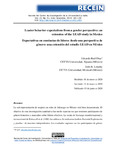| dc.contributor.author | Diaz, Eduardo Raúl | |
| dc.contributor.author | Lituchy, Terri R. | |
| dc.date.accessioned | 2020-08-07T13:22:09Z | |
| dc.date.available | 2020-08-07T13:22:09Z | |
| dc.date.issued | 2019-12 | |
| dc.identifier.citation | Diaz, E. R. y Lituchy, T. R. (2019). Leader behavior expectations from a gender perspective: an extension of the LEAD study in Mexico. Revista del Centro de Investigación de la Universidad La Salle, 13(52), 101-120. | es_MX |
| dc.identifier.issn | 1405-6690 | |
| dc.identifier.issn | 1665-8512 | |
| dc.identifier.other | http://doi.org/10.26457/recein.v13i52.2459 | |
| dc.identifier.uri | http://revistasinvestigacion.lasalle.mx/index.php/recein/article/view/2459/2602 | |
| dc.description.abstract | La sub-representación de mujeres en roles de liderazgo en México está bien documentada. El objetivo de esta investigación cuantitativa fue medir expectativas que sostienen participantes de género femenino y masculino sobre líderes efectivos. La escala de liderazgo transformacional y transaccional de Podsakoff et al. (1990) fue utilizada. Se realizaron Análisis Factorial Exploratorio y pruebas t de muestras independientes. Los resultados sugieren que los participantes de género masculino y femenino asignan niveles similares de importancia al rol del líder en inspirar un propósito compartido. Además, participantes de género femenino atribuyen menor importancia que sus contrapartes al rol del líder en trabajar a través de divisiones organizacionales y en establecer altas expectativas de desempeño. Las limitantes incluyen la naturaleza transversal del estudio y el enfoque en estudiantes de posgrado y egresados. Han sido pocas las investigaciones sobre expectativas en las conductas de líderes desde una perspectiva de género en México, lo cual informa sobre la novedad de este estudio. | es_MX |
| dc.description.abstract | The underrepresentation of women in leadership roles in Mexico is well documented. The goal of this research was to measure female and male participant expectations of effective leaders. Podsakoff et al.’s (1990) scale of transformational and transactional leader behaviors was translated and adapted for this purpose. Factor analyses and t-tests were conducted. The results suggest that female and male participants attribute similar levels of importance to the role of the leader in the inspiring a shared purpose dimension. The results also suggest that females in the sample attribute less importance to working across organizational boundaries and setting high performance expectations than males in the sample. Limitations include the cross-sectional nature of the study and focus on graduate students and alumni. Few studies on leader behavior expectations from a gender perspective have been conducted in Mexico, which informs to the novelty of this research. | es_MX |
| dc.format | pdf | es_MX |
| dc.language.iso | eng | es_MX |
| dc.publisher | Universidad La Salle México, Dirección de Posgrado e Investigación | es_MX |
| dc.rights | Acceso abierto | es_MX |
| dc.rights.uri | http://creativecommons.org/licenses/by-nc-nd/4.0 | es_MX |
| dc.subject | Cultura | es_MX |
| dc.subject | Sub-representación | es_MX |
| dc.subject | Liderazgo | es_MX |
| dc.subject | Expectativas | es_MX |
| dc.subject | Estudiantes de posgrado | es_MX |
| dc.subject | Culture | es_MX |
| dc.subject | Underrepresentation | es_MX |
| dc.subject | Leadership | es_MX |
| dc.subject | Expectations | es_MX |
| dc.subject | Graduate students | es_MX |
| dc.subject.classification | CIENCIAS SOCIALES::SOCIOLOGÍA | es_MX |
| dc.subject.other | Aptitud de mando | es_MX |
| dc.title | Leader behavior expectations from a gender perspective: an extension of the LEAD study in Mexico | es_MX |
| dc.title.alternative | Expectativas en conductas de líderes desde una perspectiva de género: una extensión del estudio LEAD en México | es_MX |
| dc.type | article | es_MX |
| dc.identificator | 5||63 | es_MX |
| dc.audience | generalPublic | es_MX |







